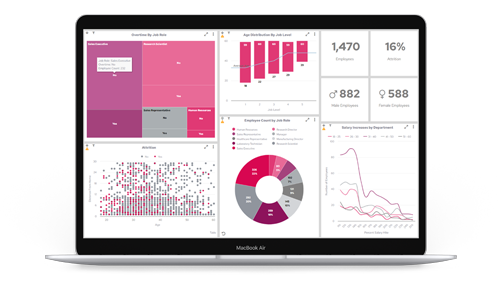There are approximately 30,000 SaaS companies worldwide, and it’s estimated that by 2025, 85% of business apps will be SaaS-based.
SaaS solutions exist in nearly every industry, including the likes of Fintech, Healthtech, Edtech, and Retailtech. All SaaS vendors, by nature, are enablers in efficiency; the solutions you build aim to make users’ lives easier, providing them with unique insight and the ability to automate their processes.
With that in mind, it is unsurprising that many SaaS vendors are seeking out AI solutions to elevate their platform with increased efficiencies and distinctive capabilities that could act as a differentiator from their competitors. The SaaS market continues to grow year-on-year, and with that comes both new entrants and existing vendors levelling up their product offering. SaaS vendors need to pivot to adopt the latest emerging technologies to avoid getting left behind. While leveraging AI will be crucial to increasing competitiveness in this market, some distinctions must be made to the types of AI on offer.
Traditional ML Vs Causal AI
Causal AI is an emerging form of machine learning that strives to go beyond traditional ML models. Traditional models can identify the extent to which multiple events are related using the data inputted, whereas Causal AI goes beyond this to identify the root cause of events, providing a much deeper understanding of the data. This gives Causal AI a unique edge over traditional ML, as it’s integral for users to understand why a particular event has occurred, in order to make effective change.
Causal AI is the next rung of the ladder in predictive analytics, delivering much richer insight that shows a truer picture of events. Causal AI is a form of emergent AI that is going beyond hindsight and moving into foresight; as understanding how and why something happened in the past allows you to predict the consequences of change. For SaaS applications, Causal AI has the ability to deliver improved observability, inclusive decision-making, and accuracy.
The Benefits of Causal AI in SaaS
Staying Ahead of the Curve
Businesses that create a lot of data seek to not just understand why certain outcomes occurred in the past but also forecast future outcomes. For example, an ecommerce platform may have seen growth in a particular product line, and the data suggests that this growth will continue. But just looking at this one component means you will have missed the fact that the majority of the sales were driven by an email campaign that is coming to an end, and actually, the growth will cease without it.
Improved Observability & Transparency
Due to this approach and how it follows a decision-tree model to visualize the results means Causal AI is considerably more transparent than traditional ML. The reasoning behind the outcome is explained, and it surfaces the context behind the problem, making it far easier to observe for any user, boosting both human interaction and understanding. User understanding is vital as their domain knowledge is the true gold dust; meaning utilising a form of ML that promotes co-piloting and compliments human involvement rather than replaces it leads to improved outcomes and decision-making. Furthermore, this format also means that Causal AI is more auditable than previous versions of ML; users can understand why a conclusion was reached, scrutinize it, and even spot any discrepancies in the data that could have impacted the result. All of this leads to a higher consistency in the results alongside users having greater trust in the outcomes.
Address Bias
Implementing Causal AI into your SaaS application helps to eliminate bias in the data. Previous forms of AI utilize correlation-based ML to correlate information based on historical data and operate within a black box. It can deliver an outcome but not necessarily explain how that outcome came about.
This means that when these systems are fed poor/biased information, they will reach wrong and biased conclusions. Causal AI helps uncover the causal relationships between the inputted data and the outcome, and by explaining how an outcome came about it can also explain how a bias occurred. Using this form of AI in your SaaS application allows your users to have greater confidence in the conclusions that are made.
Explainability
Causal AI is already gaining recognition for its ability to provide more explainable insights. Due to the cause-and-effect approach mentioned earlier, it goes beneath the surface to uncover the real root cause and delivers users with insight that they can easily review and understand.
Using Causal AI in your analytics platform can enable you to give users the answers they are simply unable to get elsewhere. Beyond this, the quality of Causal AI can also form the foundation for reliable recommendations in emerging generative AI technologies.
Inclusive Decision Making
Traditionally, to find the level of depth that is presented by Causal AI, you would have to be a trained data scientist. But by making this accessible to all users through a user-friendly interface in a SaaS application, it lowers the barriers to entry and enables more inclusive decision-making to be made in a range of industries. Beyond this, introducing Causal AI into your SaaS application can promote stickiness as more users will be engaged and find value in the insight. Users will uncover the value of a model quickly, helping to shorten the feedback loop and build stronger models going forward. This accessibility will allow the domain expertise of the human to fed into the AI model and even be challenged and iterated when inaccuracies or bias arise.
Engagement
As a consequence of the explainability element of Causal AI, it helps to promote buy-in from execs and other stakeholders in the adoption of AI-based technology, where lack of understanding and trust often hinders adoption in many sectors.
Embed Causal AI into Your SaaS Application
Causal AI is the inevitable next step in predictive analytics. The Pi Predict module of our embedded solution utilizes the power of Causal AI. It has the ability to find the causality of chosen variables based on historical data, all of which is demonstrated in our user-friendly decision-tree model, empowering users to make highly informed decisions. All of which can simply be embedded into your SaaS application.























